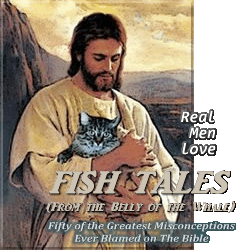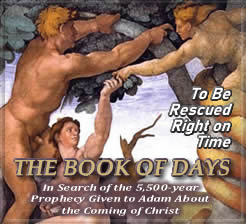Concepts in Misconceptions
Like a Thirsty Pilgrim in Search of Water
The Bible is undoubtedly the most influential book of all time. To many, it’s a wellspring of divine wisdom; to others, the source of insidious disinformation. It inspires mankind with the deepest solemnities, and it conjures up the darkest horrors. It stimulates the sublime, and justifies the perverse.
Much of the world’s greatest literature and art springs—like Athena, fully grown—from Scripture: Dante’s Divine Comedy, Blake’s Marriage of Heaven and Hell, Rembrandt’s Belshazzar’s Feast, Michelangelo’s David, and DeMille’s The Ten Commandments. It’s profoundly impacted philosophy, science, technology, and politics: Newton’s Mathematical Principles of Natural Philosophy, Kepler’s Laws of Planetary Motion, da Vinci’s Codex on the Flight of Birds, and Jefferson’s Declaration of the Causes and Necessity of Taking Up Arms.
But unfortunately, The Bible has also been used as a force for evil in the world, as many individuals, institutions, and movements have twisted its truths to serve their own purposes. Through a subtle manipulation of its message, Scripture has been used to justify the enslavement of humans, the subjection of women, and the slaughter of the animal kingdom. As the inspiration for social engineering, it’s produced such ill-fated ventures as Utopianism and Socialism, and such dastardly movements as the Salem Witch Hunts and the Spanish Inquisition. Manifested into a social system, it’s been used to underpin inhumane political regimes like Fascism, Nazism, and Communism.
In light of such historical evidence, it’s clear that no one is immune from The Bible’s ability to both bless and curse anyone who encounters its strangely contradictory contents. When one expects to find a basis for hope and peace in Scripture, we find instead the seeds of despair and strife. Instead of illuminating our hearts with light and truth, it imparts darkness and confusion.
Story Continues Below
Says Richard Price—the founder and CEO of Academia.edu—on his podcast In Depth With Academia:
Fish Tales (From the Belly of the Whale): Fifty of the Greatest Misconceptions Ever Blamed on The Bible is:
To hear Price’s book review of Fish Tales (From the Belly of the Whale), CLICK HERE.
To hear Kent and Zen Garcia talk about correcting biblical misconceptions, from June 23rd, 2021, CLICK BELOW.
Story Continues From Above
Just think how often in your own experience you’ve been confronted with some apparently profound bit of wisdom, only to find yourself wondering why it just doesn’t seem to ring true. You may even ask yourself about the source of this so-called “truth,” so you search your heart, you search every book you can find on the subject, and more importantly, you search the Scriptures, all in a sincere effort to discover the origin of that particular gem of wisdom. Yet much to your chagrin, you find that your quest has fallen short of the goal. Nowhere is that particular truth articulated in the same way as it was told to you. Why, you ask? Why should this be the case?
The sad reality is that in many instances the so-called “truths” that we’re being sold on a daily basis are nothing more than a bill of goods, a mere shadow of the original facts as they truly originated. Instead, they are truths that have, over the course of time, been watered down, regurgitated and, quite frankly, repackaged under a different frame of reference from the one in which they were first conceived. Worse still, when you search The Bible from cover to cover, you find that the verse as it was quoted is nowhere at all to be found. It is conspicuously absent, as is anything even remotely resembling it. So you are left even more confused, haunted by the notion that it useless to even attempt discovering the real truth. It is then that you are confronted by an even more tragic alternative, and in its wake, you are left with the most miserable of all conclusions: There must be no point in searching for truth because there is no real basis for truth in the first place.
Yet like a thirsty pilgrim in desperate search of water, you stubbornly cling to the possibility that eventually you might stumble onto the spring of truth nonetheless. And you do so because fortunately that is the way that God has made us. Innate in our very nature is a yearning for the truth, a hunger that by God’s design cannot be stifled, no matter how much the world, the flesh, and the devil conspire to dull it. As the great Christian apologetic C.S. Lewis has pointed out so eloquently:
“We are something like people who must believe in the reality of Heaven even though we have yet to go there ourselves, even as people who may have never tasted food or water would still know that such things as food and water existed simply because we are men and women who hunger and thirst for them.”
In other words, even if we had never seen or tasted these things we call food and water, we would at least know of their existence by virtue of the fact that we had a desire for them. And as such, we could never resist the urge to discover what these things called food and water truly were, no matter how hard we tried to live without them.
So, likewise, we naturally must persevere in our efforts, however feeble and meandering, to ferret out the true meaning of what our hearts and minds must grapple with daily. We must continually strive to understand the true nature of reality, because otherwise we are robbed of our most valuable quality—in fact, our birthright as human beings created in God’s image—which is to seek for the truth and grasp it, regardless of what others may think of us in our homely efforts. We must do so because something deep down in all of us can and does comprehend the truth when we hear it, in spite of all our doubts and fears to the contrary. And this very knowing is actually the essence of what it means to be human, having been originally created to understand the mystery of God’s Universe in all its glory and to see it as a genuine reflection of the divine nature, as God has always intended for us to know it. In this, one can catch a glimpse into one of the most sublime paradoxes that mankind has yet to contemplate; as Albert Einstein explained, when he observed: “The great mystery of the Universe is, in fact, its comprehensibility.”







